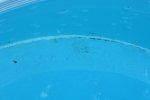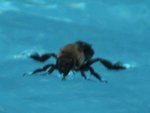Aaargh !! this is my third try tonight.
Why no chlorine?
[attachment=0:14uiyho2]LFJ_0044_cropped_hsv.JPG[/attachment:14uiyho2]
I am a bit of a naturalist/conservationist. I drive a Prius because of the low emissions and high fuel economy. I used to drive a Geo Metro for the same reason. I'm also an experimentalist, and of the scientific western mind: "show me", "prove it", "Let's see what happens", "Can I do it if I try", etc. I could, and have, spent many minutes and pages explaining why I want to try to go chlorine free. It has nothing to do with blind following blind, as some would try to paint me. It has nothing to do with romantical passionate want blinding me to facts and reality. If I could have a safe pool of simple rain water, that's what I'd do. We even use the backwash water to help water our plants.
Tell me, what would happen to that bee if I used the BBB method? He'd probably die. He might not even stop for the drink, and I would miss a miracle of nature. What would happen to the frog that has adopted our pool for a home? I just hope I don't end up with a water mocassin as well.
Unfortunately, since I seem to have some black algae, and we don't really want the algae in the pool, as it eats the concrete, I'm going to have to resort to some pretty potent poison = dry shock, which will screw up the naturalness of the water, darn. But, well, that's the price. (I'll remove the frog first.) And I don't want to spend any more time justifying or discussing one way or the other, logic or lack of logic. I'd rather people just wait and see how my experiment works itself out, and what conclusions I/we can draw from it.
I also want to continue learning, asking questions, and getting reasonable answers. I have observed over the years that as I bravely ask questions, others seem to learn from the answers as well, having been too timid to ask, or not knowing how to pose the question to get a useful answer.
I think this is short and complete enough.




